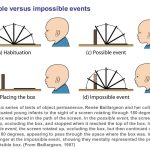As humans, we’re constantly learning and adapting to our environment. But did you know that this process of cognitive development isn’t random or haphazard? According to Swiss psychologist Jean Piaget, it’s actually characteristic of a sequence of stages that unfold in a predictable order.
The Power of Piaget’s Theory
Piaget’s theory on cognitive development has been widely influential and remains a cornerstone of modern psychology. His work sheds light on how our thinking abilities change as we grow, and why some people may excel at certain tasks or concepts before others. By understanding these stages, we can gain valuable insights into the learning process and develop more effective teaching methods.
The First Stage: Sensorimotor (0-2 years)
At birth, our cognitive abilities are limited to basic sensory-motor functions like sucking, grasping, and tracking visual stimuli. As we grow, infants begin to explore their environment through touch, taste, smell, and sight. Piaget calls this stage “sensorimotor” because children rely heavily on their senses to make sense of the world. During this period, they learn by associating sensory experiences with motor actions – like linking sounds with movements.
This stage sets the foundation for future cognitive development, as infants develop object permanence (the understanding that objects continue to exist even when out of sight) and begin to understand cause-and-effect relationships. With this solid base in place, children are better equipped to tackle more complex cognitive tasks as they progress through subsequent stages.
As we explored earlier, Piaget’s theory on cognitive development suggests that it unfolds in a predictable sequence of stages. In this continuation, we’ll delve deeper into the stages that follow sensorimotor and examine how they shape our thinking abilities.
The Second Stage: Preoperational (2-7 years)
As children transition from the sensorimotor stage to preoperational, they begin to use symbols and language to represent their thoughts. This newfound ability allows them to engage in abstract thinking and imagine scenarios that aren’t necessarily tied to immediate sensory experiences. However, Piaget notes that children at this stage still struggle with understanding other people’s perspectives and tend to view the world from their own egocentric viewpoint.
This stage is characterized by an increasing focus on language, social interaction, and fantasy play. Children begin to develop their own theories about how the world works, often based on their personal experiences and observations. While this creativity can be beneficial, it also means that children may not fully understand the underlying logic or consequences of their actions.
The Third Stage: Concrete Operational (7-11 years)
As children enter the concrete operational stage, they develop the ability to think logically about concrete objects and events. They can now solve problems by using mental operations like classification, seriation, and conservation – essential skills for everyday life. During this period, children learn to think more systematically and consider multiple perspectives.
This stage is marked by an increased ability to reason and problem-solve using concrete objects or real-life scenarios. Children become better at understanding cause-and-effect relationships and can predict the outcomes of various actions. With their newfound logical thinking skills, they’re able to tackle more complex tasks and demonstrate a greater sense of independence.
The Path Forward
In our next segment, we’ll explore the final stage of Piaget’s cognitive development theory: formal operational thinking. This stage is characterized by the ability to think abstractly about hypothetical situations and consider multiple perspectives – essential skills for making informed decisions in life.
Explore Piaget’s Theory in more depthAs we continue to explore Piaget’s theory, it’s clear that understanding these stages can provide valuable insights into the learning process and how our thinking abilities evolve over time. By grasping these fundamental concepts, educators and parents can better support children as they grow and develop.
Unlock the Secrets of Cognitive Development
We are ready to answer your questions, day or night.
Start chatAs we’ve explored Piaget’s theory on cognitive development, it’s clear that his work offers valuable insights into how our thinking abilities change as we grow. By understanding the sequence of stages he identified, we can better grasp why some people may excel at certain tasks or concepts before others.
Summarizing the Key Points
We’ve covered three main stages in Piaget’s theory: sensorimotor (0-2 years), preoperational (2-7 years), and formal operational (7+ years). Each stage builds upon the previous one, with children gradually developing more complex thinking abilities.
In the first stage, sensorimotor, infants learn through sensory-motor associations and develop object permanence. As they grow, they move into the preoperational stage, where they begin to use symbols and language but still struggle with abstract thinking. Finally, in the formal operational stage, adolescents and adults develop the ability to think logically and reason abstractly.
Final Insights
Piaget’s theory reminds us that cognitive development is a gradual process that unfolds over time. By acknowledging this sequence of stages, we can better understand how children learn and adapt to their environment. This knowledge can be applied in various contexts, from education to personal relationships.
A Compelling Conclusion
In conclusion, Piaget’s theory on cognitive development offers a compelling framework for understanding the human learning process. By recognizing the predictable sequence of stages that our thinking abilities follow, we can better support and nurture growth in ourselves and others. Whether you’re an educator, a parent, or simply someone interested in personal development, Piaget’s work provides valuable insights into how to foster cognitive growth and promote lifelong learning.
The best natural treatment for women’s jock itch: Are you tired of dealing with itchy skin? Discover the most effective and gentle natural remedies to say goodbye to jock itch once and for all!
I just adore you asking for more: Are you looking for ways to show your loved ones how much you care? Find out the secrets to surprising them with thoughtful gestures and making their day!


